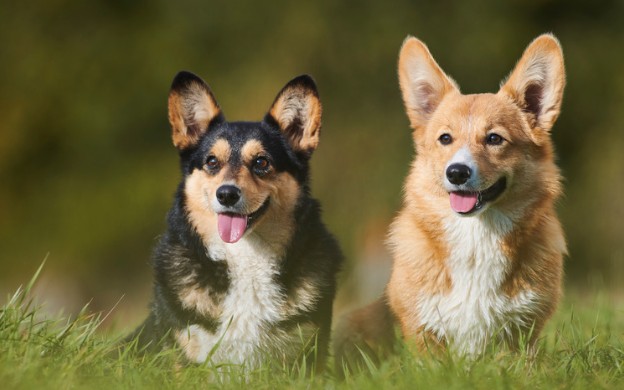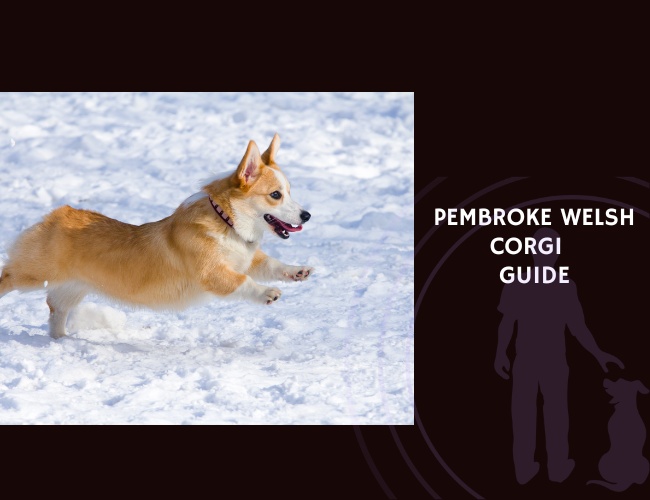Introduction to the Pembroke Welsh Corgi
Exploring the Corgi’s Roots
Pembroke Welsh Corgis have a truly captivating story. Their beginnings trace back to Wales, where they worked as skilled herding dogs for farmers. Over centuries, they became valued partners thanks to their keen intelligence and sturdy build. Despite their small stature, Pembrokes handled cattle with a boldness that won the respect of rural communities and cemented their place in British folklore.
Distinctive Looks That Steal the Show
A Pembroke Welsh Corgi stands out right away for its fox-like face, bright eyes, and alert expression. Their bodies are low and long, with strong legs and sturdy chests. What makes them especially adorable is their naturally short or “docked” tail—a feature that separates them from the Cardigan Welsh Corgi, which has a long tail. Their fluffy double coat adds to their charm and helps them handle various weather conditions. Classic coat colors include red, sable, fawn, and black and tan, usually with white markings.
A Modern-Day Icon
Pembroke Welsh Corgis are more than herding dogs—they are pop culture sweethearts! Their rise to fame started with the British royal family, especially Queen Elizabeth II, whose lifelong love for the breed brought them international attention. Their curious personality and heartwarming grin have sparked countless memes, animated appearances, and a solid following on social media. Today, many people admire Corgis for their playful spirit, unique look, and all-around good nature.
Next, we’ll get to know the character and behavior of these lovable companions.
Character & Behavior
Herding Instinct and Natural Behaviors
The Pembroke Welsh Corgi’s herding instinct is hardwired and can be seen in their playful but determined attitude. These dogs often show classic herding moves like heel-nipping and circling, even when they’re just playing at home. You’ll notice Corgis are motion-sensitive—sudden running kids or darting pets may activate their desire to chase and guide everyone back to “order.” This natural urge stems from generations of work on farms.
Social Bonding and Attachment
Pembroke Welsh Corgis thrive on strong connections with their families. They tend to form a deep attachment with their humans, following from room to room and showing excitement when you return home. This breed responds well to positive interaction, seeking out pats, gentle words, and opportunities to be close. Many Corgis show secure bonds, marked by trust and a relaxed attitude around loved ones. Their attachment also means they can become anxious if left alone for long periods, so regular, loving contact is vital to their happiness.
Temperament and Reactivity
Corgis are known for being outgoing, alert, and playful. Most Pembrokes are sociable with people and other pets, though their herding roots can make them a bit bossy or possessive with toys. Some may show wariness with strangers or bark when something is unusual, revealing their natural protectiveness. While fearfulness is not typical, every Corgi is unique—a few individuals might be shy or more sensitive to loud noises. They have moderate reactivity thresholds, meaning they’ll warn but not often overreact unless truly stressed.
Understanding these core behaviors helps you bring out the best in your Corgi, building a joyful, trusting relationship.
Next, we’ll explore how these expressive pups use sounds and body language to communicate their needs and feelings.
Vocalization & Communication
Understanding how your Corgi “talks”
Pembroke Welsh Corgis are famous for their expressive voices and body language. Their vocal patterns are more than just noise—they’re powerful ways to express emotion, signal needs, and communicate with both people and other animals. Most Pembrokes have a sharp, alert bark that can range from playful to demanding, and they’ll often “talk back” when excited. Whines may signal eagerness, frustration, or a call for attention. You might also notice low grumbles or “chuffles” when they’re content and relaxed.
These sound effects are part of the Corgi’s herding heritage, used to control livestock. Even today, they may bark when they see movement outside the window or try to herd children during play.
Pembroke vs Cardigan Communication
Pembroke and Cardigan Welsh Corgis share a similar language but there are subtle differences in their communication styles. Pembrokes are generally more vocal and quick to express excitement or concern with a bark, while Cardigans may be more reserved and measured. Individual dogs have unique vocal habits, but overall, Pembrokes tend to be the “louder” breed.
Reading Corgi Body Language
Understanding your Corgi’s messages isn’t just about listening. Their compact body is packed with expressive cues. A relaxed tail wag and open mouth show comfort and friendliness, while flattened ears or avoidance of eye contact might mean your pup feels anxious. Raised hackles or a stiff posture signal arousal or stress.
Learning your own Corgi’s patterns will help strengthen your bond and create clearer communication. Every bark, whine, and wiggle tail tells a story—look and listen carefully to know what your furry friend is saying.
As you get to know your Corgi’s communications, you’ll be able to nurture a trusting and engaging relationship filled with less confusion and more connection.
Training & Education
Learning speed, command retention, and trainability
Pembroke Welsh Corgis shine in training thanks to their intelligence and quick learning speed. They are known to pick up new commands rapidly, often needing only a few repetitions before they respond consistently. In structured sessions, most Corgis can retain basic commands over time, but regular refreshers help keep their skills sharp. Their herding background means they’re smart problem-solvers and quick to notice patterns, making training feel like a game to them.
Motivational profiles and effective reinforcement techniques
Not all Corgis are motivated in the same way, so it’s important to find what excites your dog most. Some love tasty treats, while others may respond best to toys, enthusiastic praise, or even a gentle scratch behind the ears. Using a mix lets you tailor each lesson and keeps things fun. Positive reinforcement works wonders—rewarding desired behavior encourages Corgis to repeat it. Try to figure out your pup’s favorite reward for a truly motivating experience.
Impulse control training and managing behavioral frustration
Because Corgis are energetic and eager, they sometimes act before they think. Teaching impulse control through exercises like “wait” or “leave it” can help your Corgi learn patience. Starting with short waiting periods and gradually increasing the challenge makes it manageable. Signs of behavioral frustration, like barking or fussing, mean your dog may need shorter sessions and more encouragement. Slow progress is still progress—celebrate each small win with your Corgi! 🐾
Supporting your Corgi’s learning journey can strengthen your bond and lay the foundation for a happy, well-behaved companion.

Performance & Activities
Suitability for Canine Sports
Pembroke Welsh Corgis might be small, but they’re big on action! These dogs truly shine in structured canine sports such as agility, obedience, and rally. Their herding instincts translate to sharp focus and quick movements, making them spirited competitors on the course. With their speed and agility, it’s not surprising many Corgis breeze through obstacle courses and master challenging routines with an enthusiastic attitude. Participating in these activities helps keep their minds and bodies healthy while providing a fun outlet for pent-up energy.
Cognitive Abilities and Problem-Solving Skills
Corgis are famously clever and curious. Their intelligence is clear when you give them puzzles or tasks that require independent thinking. They often figure out solutions quickly—sometimes even surprising their owners by opening gates or learning routines after only a few repetitions. In training sessions, Corgis respond well to variety, especially when you package new tricks and problems as games. This keeps their minds sharp and reduces frustration.
Mental Enrichment to Prevent Boredom
For a Pembroke Welsh Corgi, a bored mind can quickly become a mischievous one! To keep them content, aim for regular mental enrichment.
Here are a few supportive strategies:
- Rotate interactive puzzle toys filled with kibbles or treats.
- Change up their walking routes and introduce new scents.
- Try scent tracking or hide-and-seek games indoors or in the yard.
By meeting their need for both physical activity and mental stimulation, you help your Corgi thrive—happier, healthier, and less likely to develop unwanted habits.
As you explore how to support your Corgi’s active mind and lifestyle, make sure you also consider what fuels their energy and helps them stay fit every day.
Nutritional Recommendations
Energy needs and portion control
Pembroke Welsh Corgis are full of energy, but their small, sturdy bodies mean they need careful portion sizing. While calorie requirements vary based on factors like age, weight, and activity level, most Corgis need a diet that’s tailored to keep them active but not overweight. Use your dog’s current weight and activity when measuring food, and check for a visible waist and easily felt ribs to see if portions are on track. Always speak with your veterinarian for personalized advice—small adjustments go a long way! 🥕
Obesity risk and healthy habits
Corgis are prone to obesity. Their genetic makeup can influence appetite-regulating hormones, which may cause them to feel hungry even after eating. Obesity can stress their joints and impact health. To help, stick to regular feeding times, measure daily portions, and go easy on high-calorie treats. Fun walks or playtime not only burn energy but help prevent weight gain and boredom. Remember: treats should make up no more than ten percent of daily calories.
Supporting joint health
Because Pembroke Welsh Corgis can face skeletal challenges, joint support should start early. Look for foods or supplements rich in glucosamine, chondroitin, and omega-3 fatty acids—these nutrients may aid cartilage and joint mobility as your dog ages. Including these in your Corgi’s diet can help them maintain a bright, active life.
With the basics of nutrition and weight management in mind, Corgi care continues by looking at what foods and ingredients keep their sensitive stomachs and immune systems healthy.
Bold. Bright. Beloved.
Loyal Spark. The Pembroke Welsh Corgi radiates with charm, purpose, and unwavering attachment. This breed isn’t just a pet—it’s a presence. Every glance, every wag, speaks of devotion earned through centuries of working side by side with humans.
Sharp Mind, Short Legs.
Behind that happy face lies a quick, observant brain. Pembrokes excel when given something to learn, someone to follow, or something to do. Their intelligence runs deep, and their joy in solving problems keeps them one step ahead—even when mischief is involved.



Heart of the Home.
More than companions, they’re companions with instincts. Whether following you from room to room or watching your every move, these dogs don’t just live in your home—they anchor it with love, alertness, and emotional warmth that endures..
Food Sensitivities & Digestive Health
Common intolerances and allergens
Pembroke Welsh Corgis often have sensitive stomachs. Many experience food intolerances, especially to common allergens like dairy, wheat, and soy. Some Corgis might react to beef, chicken, or artificial additives found in commercial treats. Symptoms of food intolerance can include itching, upset stomach, chronic ear infections, or soft stools. Noticing these early and working with your vet is key to keeping your pup comfortable and healthy. 🐶
Digestive system considerations
The digestive system of a Corgi thrives on easily digestible proteins and a moderate amount of fiber. Lean meats such as chicken, turkey, or fish often work well. Whole grains like brown rice and oatmeal provide energy without aggravating sensitive tummies. Fruits and vegetables—especially pumpkin, sweet potato, and leafy greens—can aid digestion and provide vitamins. Avoid table scraps and foods high in fat, as these can quickly upset your Corgi’s digestion.
Optimal diet and beneficial nutraceuticals
To support both gut and overall health, consider including nutraceuticals like probiotics and antioxidants. Probiotics can help balance gut flora, easing symptoms of food intolerance. Medium-chain triglycerides (MCTs) and antioxidants may promote healthy brain and immune function as your Corgi matures. Dietary changes should always be introduced slowly to avoid stomach upset. Whenever you are in doubt about best options, chat with your vet first for guidance.
Shifting focus from what’s in the bowl, understanding health risks ensures a proactive approach to your Corgi’s well-being.
Common Health Concerns
Intervertebral disc disease and chondrodystrophy
Pembroke Welsh Corgis are more prone to intervertebral disc disease (IVDD) due to their chondrodystrophic build. Their long bodies and short legs can place extra strain on the spine, increasing IVDD risk. Signs of IVDD include pain, reluctance to move, or even sudden weakness in the hind legs. Genetics, especially the presence of the FGF4 retrogene, contribute to this risk. Prevention focuses on keeping your Corgi at a healthy weight, providing ramps instead of stairs, and avoiding rough jumping or twisting activities.
Degenerative myelopathy and genetic predisposition
Degenerative myelopathy (DM) is another concern for this breed. DM is a progressive, genetic disease that impacts the spinal cord, often starting later in life. The SOD1 gene mutation is associated with DM in Pembroke Welsh Corgis. Dogs may begin to drag their hind feet, progressing to weakness or paralysis. While there is no cure, supportive care, regular exercise, and physical therapy can help maintain quality of life. Genetic testing is available and can inform breeding decisions and early management.
Hip and elbow dysplasia
Though not as common as in larger breeds, Pembrokes can develop hip and elbow dysplasia. These are genetic conditions where the joints do not form properly, leading to arthritis and pain. Early signs may include stiffness or limping. Routine screening of breeding dogs through radiographs helps reduce the risk, and keeping your dog lean reduces joint stress. Supplements like glucosamine or omega-3s may support joint health, but always consult a veterinarian before adding new treatments.
Understanding these health challenges helps you navigate care and support your Corgi’s well-being as they enjoy an active, happy life.
Endocrine & Ocular Health
Understanding Thyroid Function and Common Endocrine Disorders
Pembroke Welsh Corgis, like many breeds, can be prone to certain endocrine system issues. One of the most common problems is hypothyroidism, where the thyroid gland doesn’t produce enough hormones. Signs may include weight gain, lethargy, thinning fur, and skin problems. Autoimmune thyroiditis is another concern, where the immune system attacks the thyroid gland. Less often, Corgis can face adrenal issues, though these are rarer. Regular hormonal testing can help detect early signs and keep your pup active and healthy.
Eye Health and Progressive Retinal Atrophy (PRA)
Corgis are known for their bright, expressive eyes, but some are at risk for inherited eye conditions. Progressive Retinal Atrophy (PRA) is a genetic eye disease that leads to gradual vision loss. PRA often isn’t visible at first, but as it progresses, you might notice your Corgi bumping into things or struggling in low light. Other eye problems like cataracts or distichiasis (extra eyelashes that can irritate the eye) also occur. Early detection through ophthalmological exams can make a big difference in managing these conditions.
The Importance of Regular Screening
Staying on top of your Corgi’s health means routine screening is a must. Annual check-ups with hormonal and eye exams help spot thyroid, adrenal, or ocular issues before they become major problems. Genetic testing is also available for some inherited disorders, so breeders can make informed choices, and owners can prepare for their dog’s needs.
By staying proactive, you are taking solid steps to ensure your Pembroke remains healthy, happy, and ready for every cuddly moment or active adventure. 🩺

Lifestyle & Environmental Adaptability
Urban and Rural Adaptability
Pembroke Welsh Corgis are known for their flexibility in adjusting to both city apartments and country homes. In urban areas, they often adapt well to smaller living spaces as long as they receive regular outdoor walks and opportunities to explore. These dogs are sensitive to changes in their environment, so it’s important to offer stability and consistent routines. In rural settings, Corgis enjoy the freedom to roam, run, and satisfy their herding instincts. Regardless of location, keeping an eye on their curiosity and love for adventure is key to their safety and happiness.
Exercise Needs and Activity Level
Corgis are energetic by nature, with exercise needs that go beyond a quick walk around the block. Daily activity—at least 30 to 45 minutes—is essential. This can include brisk walks, play sessions, or puzzle toys. Mental stimulation is as important as physical effort since boredom can lead to unwanted behaviors. Always tailor exercises to their age and health status, taking care not to overexert young puppies or aging seniors.
Family Dynamics and Child Compatibility
When it comes to family life, Corgis typically form strong bonds with all members and show patience around children. With their playful spirit and gentle manners, they often become fast friends with kids. However, their herding background means they might occasionally try to herd young children by nipping at heels. Teaching both children and dogs proper interactions fosters harmony and reduces chances of misunderstandings. Corgis usually thrive in a loving home that values their loyalty and need for companionship.
Next, we’ll continue exploring aspects that contribute to a Pembroke Welsh Corgi’s comfort and well-being throughout the year.
Thermoregulation & Comfort
Adapting to Heat and Cold
Pembroke Welsh Corgis are double-coated, giving them natural insulation against both hot and cold weather. Their undercoat keeps them warm in the winter, while the topcoat helps repel moisture and heat in the summer. That said, Corgis are not immune to temperature extremes. In high heat, they can be at risk for overheating, especially during intense exercise or if left in the sun too long. Always provide plenty of fresh water and shade on warm days. In chilly weather, their double coat offers good protection, but be mindful of ice, snow, and cold winds—short walks and paw protection help keep them comfortable.
Seasonal Care Requirements
Throughout the year, Corgis shed heavily, especially as seasons change. Regular brushing, at least twice a week, helps manage loose fur and keeps the coat healthy. In summer, avoid midday walks and watch for signs of heat stress, like excessive panting. In winter, dry your Corgi thoroughly after outdoor play, and check for ice between toes.
Environmental Sensitivity and Comfort
Every Corgi thrives best when their environment is adapted to their needs. In urban apartments, provide cool resting spots away from direct sunlight. Use fans or air conditioning in hot weather. In colder homes, a soft bed off the floor helps keep them warm. Extra attention to airflow, drafts, and humidity ensures optimal comfort all year round.
Good thermoregulation and thoughtful accommodations support your Corgi’s wellbeing, no matter where you live. With these steps, your companion stays comfortable in every season, paving the way for a healthy, happy life together.
Aging & Senior Care
As Pembroke Welsh Corgis grow older, you may notice changes in how they move and interact with their world. Just like people, senior Corgis might slow down and need a few extra comforts. Supporting their aging journey is all about understanding what they need now—and what can keep their tails wagging for years to come. 🐾
Mobility and Quality of Life
Many senior Corgis develop mobility challenges, such as stiffness or trouble with stairs, due to joint issues like hip and elbow dysplasia or arthritis. You might see them hesitate to jump or need longer to get comfy. Soft bedding, ramps instead of steps, and non-slip floors can help them stay independent and comfortable. Regular, gentle activity—like slow walks or light play—supports their muscle strength without overworking their joints.
Adapting to Changing Needs
Older Corgis may struggle with vision or hearing, so keeping furniture in the same spots helps them feel safe. Keep fresh water and food within easy reach, and try to reduce stress from loud noises or big changes at home. Regular grooming remains important, since some may not be able to groom themselves as well.
Vet visits and health checks are essential to catch age-related problems early. Talk with your vet about using joint supplements or medications for pain management, and discuss diet changes that support senior health, including weight control and easy-to-digest protein.
Supporting Longevity
Preventative health is key for a happy senior dog. Maintain a balanced weight and keep up with parasite control and dental care. Mental enrichment, like gentle puzzle toys or scent games, helps keep their minds sharp. A warm bed and lots of love ensure they stay comfortable and happy as they age.
With thoughtful attention, your Corgi’s golden years can be full of comfort, joy, and companionship. 🧡
Conclusion: Is a Pembroke Welsh Corgi Right for You?
Key Considerations for Potential Owners
Choosing a Pembroke Welsh Corgi is a big decision. This breed is full of energy, intelligence, and affection. They need plenty of attention, daily mental and physical activity, and strong social bonds with their humans. Their herding instincts can show up during play, which means Corgis often need patient guidance and consistent training.
Health care is important too. Corgis are prone to joint issues, weight gain, and a few genetic conditions, so regular vet visits and careful dietary management play key roles in their quality of life. Grooming is also essential, as their double coat sheds, especially during season changes.
Lifestyle Compatibility Assessment
Ask yourself a few questions to see if this breed fits your lifestyle:
- Can you offer at least one hour of dedicated activity every day?
- Are you prepared for regular grooming and cleaning up fur?
- Do you have time for positive, consistent training?
- Is your household ready to manage a dog that may try to “herd” children or other pets?
If you answered yes, a Pembroke Welsh Corgi could thrive in your home—urban or rural.
Resources for Further Support
Support and education are always available. Breed clubs, like the Pembroke Welsh Corgi Club of America, offer networking and information. Your local veterinarian is key for health advice. Finally, keep learning through reliable online communities and updated veterinary resources to make sure your Corgi has a happy, healthy life. 🐾










